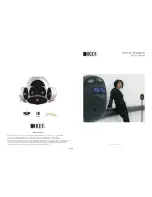
crossover). If it does, set the low-pass filter on the SW10
at its highest point -180Hz - to effectively remove it from
the signal path. If the Sub/LFE Out has no crossover or
filter, set the SW10 low pass filter as outlined above in
"Features and Controls."
3)
High-Level Filtered
What it does: feeds full-range speaker-level signal to the
SW10, which sends low frequencies to the subwoofer
and returns only higher frequencies back to your main
speakers.
Benefit: your main speakers will receive only frequencies
they can easily reproduce, which effectively increases
their dynamic range and power output.
Use if:
You use smaller, bookshelf models as your main
speakers
-OR-
Your components do *not* offer PreOut or
Subwoofer/LFE Out jacks
Note: Your SW10's High Level output has a high-pass
filter which is fixed and is not adjustable. It directs all
frequencies below 100Hz to the subwoofer. This will limit
the range of frequencies reaching your main left and right
speakers, which is typically desirable when using
smaller bookshelf models.
To connect for a Speaker-Level Filtered signal (Fig. 3),
use two additional pairs of speaker cables, and connect
as follows:
• Connect one pair of speaker cables from your amp or
receiver's front L & R speaker output terminals to the
SW10's HIGH LEVEL IN - FROM AMPLIFIER binding
posts.
• Connect the second pair from the SW10's HIGH LEVEL
OUT - TO SPEAKERS binding posts to the terminals on
your L & R speakers.
4)
High-Level Full-Range
What it does: feeds full-range speaker-level signal to
both the SW10 and then on to your main speakers.
Use if:
You wish to send your L & R speakers a full range signal
Your receiver has two sets (A and B) of speaker output
terminals
-AND-
Your receiver has no Pre Out or Subwoofer/LFE Out
jacks
To connect for a High-Level Full-Range signal (Fig. 4),
use two additional pairs of speaker cables, and connect
as follows:
• For amps and receivers with separate A and B
speaker outputs, connect one pair of speaker cables
from your receiver's Speaker A outputs to your main L &
R speakers, and a second pair from your receiver's
Speaker B outputs to the SW10's FROM AMPLIFIER
binding posts. Use this method only if both A & B speak-
er outputs can operate simultaneously.
• For amps and receivers with only one set of speaker
output terminals, simply feed the same signal, in parallel,
to both your main L & R speakers and the SW10.
Connect one pair of speaker cables from your compo-
nent's speaker output terminals to the L & R speakers,
and a second pair from the same output terminals to the
SW10's FROM AMPLIFIER binding posts. The SW10's
input does not present a significant load to the receiver,
and will not compromise its output to the L & R speakers.
If you find that your receiver will not accommodate more
than one cable per output terminal, check with your NHT
dealer for alternative methods of connection.
LOW LEVEL
L
L
L
L
R
R
R
R
TO SPEAKERS
SPEAKER OUTPUTS
OUTPUT INPUT
AUTO
PWR / PRT
GAIN
MIN
40Hz
MAX
180Hz
FREQ.
VIDEO
AUDIO
180
ON
OFF
0
+
+
+
-
-
-
Reciever
Main Speakers
SW10
Back of Subwoofer
FROM AMPLIFIER
HIGH LEVEL IN/OUT
Fig. 3
LOW LEVEL
L
L
LEFT
RIGHT
L
R
R
R
TO SPEAKERS
OUTPUT INPUT
AUTO
PWR / PRT
GAIN
MIN
40Hz
MAX
180Hz
FREQ.
VIDEO
AUDIO
180
ON
OFF
0
+
+
+
+
-
-
-
-
Reciever
Main Speakers
SW10
Back of Subwoofer
FROM AMPLIFIER
HIGH LEVEL IN/OUT
SPEAKER OUTPUT
SPEAKER OUTPUT
Fig. 4






























